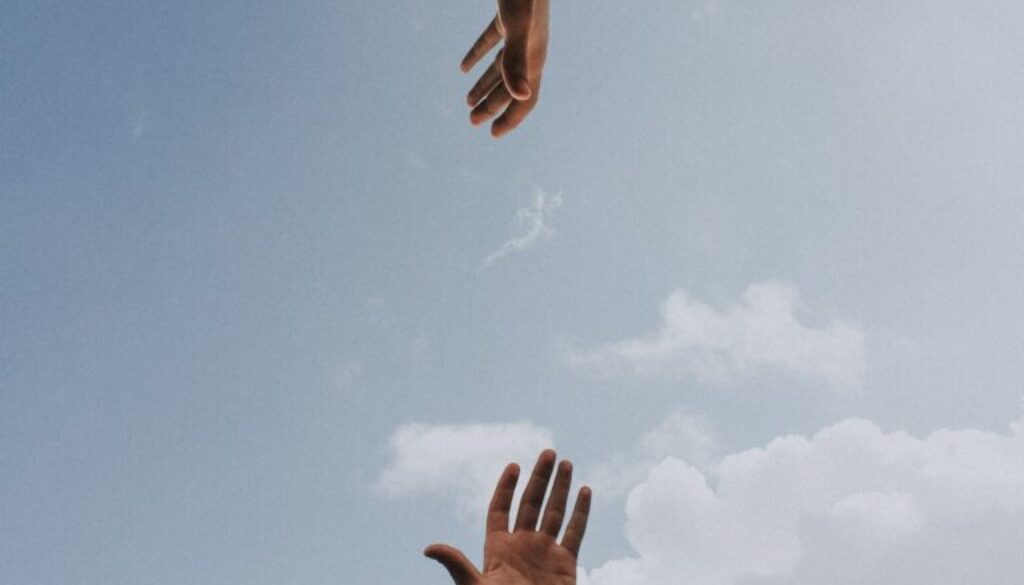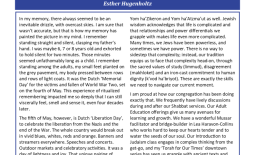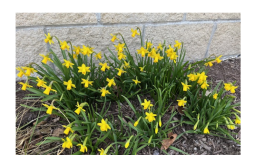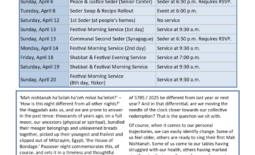Casting Wide the Net of Community
Some of you may remember that I have been intent on giving a sermon series on core Jewish values over these few months. I kicked off the series with a sermon on resilience and then hoped to address ‘tefillah’ (prayer). The Tefillah sermon was pushed back because of the Colleyville synagogue hostage taking. Today, I meant to follow up with a sermon on ‘kehillah’, community, fitting with Parashat Vayakhel, only to have been witness to Russia’s invasion of Ukraine.
Our world has shifted on its axis again and we try to find new footing. As the news cycle spins on, we yearn for solidity and assurance, to a sense of timelessness and endurance amidst the shifting sands of our age. I feel like I have given some variant of this very sermon for the last two years of the pandemic, or perhaps even since I arrived at this congregation in 2017, scrambling to understand an increasingly polarized America. To who or what do we turn for guidance and connection when confronted with such precariousness?
I had imagined a different kind of sermon. COVID cases are plummeting and the synagogue has just reopened (welcome back!). While I cannot predict the remaining trajectory of the pandemic, I am sure we were all looking forward to sharing sacred space and building holy community together; to come out of winter into the tentative first steps of spring. To look forward towards Purim and Pesach, and the communal and civic events we share with our beloved Iowa City: the Anne Frank sapling planting and beyond. All of these speak magnificently to the power of ‘kehillah’, community, and turning our hearts to our own regathering and reconnecting would have been enough—dayeinu.
Instead, we find ourselves here thrust into a new conflict and a new reality. Each of us is bound to react differently to what is unfolding in Ukraine, although our hearts are bound together in fear and pain for the Ukrainian people and their hard-won freedoms. Headlines of ‘War in Europe’ are unsettling and dispiriting, and I will add a personal note. Both my parents were alive during the Second World War (although my mother was a baby born on the cusp of liberation) which means I am only one generation removed from Europe’s previous great war. I grew up in a country ravished by that very war and almost 80 years later, the Dutch are still reckoning with that violent legacy. This applies all the more so for the Dutch (and European) Jewish community. The shattering of the vessels of trust, the breaking of the tablets of covenant, on the other side of the ocean feels all too real. I will gladly confess that I feel a deep sense of loss, grief and rage at what is unfolding in Ukraine right now, and anxiety of what may yet to come. I grew up with images of tanks rolling in the streets of Paris and Amsterdam; now tanks may be rolling down the streets of Kyiv.
The American Jewish story intersects greatly with Ukraine. The historical and contemporary ties between Ukrainian Judaism and the Ashkenazi American community are enduring. Many American Jewish families of Ashkenazi descent can trace their roots to Ukraine and the Pale of Settlement. Ukrainian Jewish history is fraught, complex and traumatic, but also resilient. Nowadays, Ukrainian Judaism is thriving, numbering between 56,000 and 140,000 strong.
When I was at Leo Baeck College, a fellow rabbinical student of mine was Ukrainian. She and her delightful daughter were part of our close-knit community and she navigated the alien-to-her British culture and language with grace. I ran into her again in 2017 at a Union for Reform Judaism biennial. Her daughter is now on the cusp of adulthood and she is now an established Reform rabbi in Odessa, who recently helped 12 women become Bat Mitzvah. My heart was overjoyed to hear that she was bringing her unique and progressive Torah to Ukraine. Our embraces were heartfelt and our shared vision was optimistic.
She is not the only Ukrainian colleague we have among our conference of liberal Rabbis. We rabbis keep track of each other’s wellbeing through social media. I am not comfortable giving more details in a ‘hot’ and evolving situation, but your prayers would be most welcome for my brave colleagues’ wellbeing. (i am purposely declining to use any real names).
‘Vayakhel Mosheh et kol adat B’nei Yisrael’, our Parashah famously opens. The details of the remainder of the portion I will not go into this year. Instead, I want us to dwell on this concept of Mosheh engaging in ‘lehakhil’, the ‘assemblage’ of his ‘edah’, community. From this verb, we derive the noun ‘kehillah’, ‘community’—a word used routinely in contemporary Jewish understanding.
What is it about this opening line, from Exodus 35:1 that is particularly resonant or meaningful? One of the key operative words here is ‘kol ha edah’—‘all of the community.’ If we glance back to chapter 19 of the book of Exodus, right before the giving of the Ten Utterances, we learn that Moses failed to relay God’s command adequately and he did not, in fact bring the whole community to Mount Sinai. The women were separated from the men, the elders and prominent were separated from the common people. Everyone partook in Revelation because Revelation remains a universal event, but the dividing lines and barriers ran deep. Moses would come to suffer the consequences, of course, through the divisiveness and heartbreak of the Golden Calf. The covenantal promise of Sinai was unfulfilled and brokenness was the result. The great calling of ‘asu li mikdash v’shachanti betocham’ – ‘build for Me a sanctuary and I will dwell among you’ is a calling we still have to action; whether that is in our small, local communities or our global, planetary community.
Rashi suggests that Moses gathered the community in a radically inclusive way after the incident of the Golden Calf which itself took place on Yom Kippur. After the brokenness, we must begin the work of t’shuvah and tikkun, of repentance and healing. Moses may have been a demonstrably flawed leader but he was a wise leader—he too needed to learn and pivot. Rashi comments on this too, indicating that this time, Moses assembled both the men and the women.
We find ourselves at a time where the bonds of community, of kehillah, can feel fractured and fragile. We haven’t seen each other in so long. We haven’t broken bread with each other in so long. In its absence, we both feel the power and vulnerability of community. We wonder how we can regroup what we have lost; retie the ties that bind. Make place for spontaneity and connection, laughter and friendship when so many of us are still trying to resolve the isolation of this pandemic. And then, from across the world, there is more shattering. We are invited to cast our net wider, to consider more broadly who is part of our ‘kehillah’: not just our fellow members of Agudas Achim, but, like a Google Maps zoom-out: our city, Iowa City, this country and of course the world entire. The Jews of Ukraine are part of our kehillah, people of conscience the world over, are part of our kehillah. ‘Kol edah’ – the entire community.
Such universalism makes a great demand on our faculty of empathy. But through personal connections and attention to the human angle that we must confront in every situation, we can do it. Moses realized his division of the Children of Israel led to more division; his alienation from his flock as he retreated into his Unio Dei, his encounter with the Divine up on the Mount, led to more alienation. Let us make a sanctuary for holy community, for the common bonds of humanity and the solidarity of friends. We may not be able to deter missiles or influence geopolitical outcomes, but we are the hands and hearts of humankind, the voice of our Jewish people and the bearers of community. It is clear, my holy siblings, my brothers and sisters, that our work is not yet done. It is only beginning. I look forward to building with you all, and inviting in God and giving love, mercy, kindness a seat at our communal table. These promises can still be fulfilled. Let us be the ones to fulfill them.





